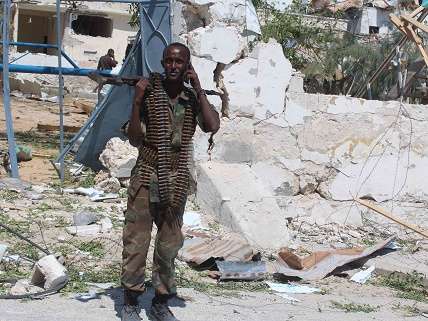U.S. Sending More Troops to Somalia—Continuing Escalation Kickstarted Last Year
About 40 U.S. troops will "train and equip" local forces.

The U.S. has deployed about 40 additional "regular" troops to Somalia, according to anonymous military officials, to "train and equip" the Somali military, continuing an escalation of the U.S. counter-terrorism campaign in Somalia that continued apace in the twilight of the Obama administration. The war in Somalia is a stark reminder of the consequences of a decade and a half of Congress' abrogation of its warmaking powers in favor of unilateral executive action—indefinite, worldwide war.
Trump's election didn't temper President Obama's desire to expand the war in Somalia, even though on the campaign trail in 2016 he warned that Trump was "uniquely unqualified" to be president. In late November, the Obama administration deemed Al-Shabaab part of the conflict covered under the post-9/11 authorization for the use of military force (AUMF). That, The New York Times reported, strengthened the legal basis for airstrikes and other counterterrorism operations in Somalia that were becoming more frequent.
Al-Shabaab, which became an affiliate of Al-Qaeda in 2012, emerged after a 2007 U.S.-backed Ethiopian invasion of Somalia to oust the Islamic Courts Union (ICU), with which a nascent Somali government refused to negotiate, from power.
The Somali government reportedly requested that the U.S. deploy additional troops to help it fight Al-Shabaab. Last October, the government requested an explanation for an air strike it said killed nearly two dozen soldiers and civilians. Last March, a U.S. airstrike killed 150 alleged militants in Somalia—the U.S. insisted there was an unspecified "imminent threat" to U.S. troops in the country.
In reporting the current U.S. troop deployment, some outlets, like the BBC, say only U.S. "counterterrorism advisors" were in the country previously—these are actually "special forces," or U.S. troops. The BBC did report on the presence of U.S. forces in Somalia after the March 2016 airstrike.
Somalia was one of the seven countries in the first iteration of Trump's travel ban aimed at majority-Muslim countries. While the U.S. "withdrew" from Somalia in 1994 after volunteering to lead the United Nations task force sent in the wake of the collapse of the Siad Barre government, it has reinserted itself in the last decade plus under the auspices of fighting terrorism.
Obama's decision late last year to pull operations in Somalia under the post-9/11 AUMF reveals the fiction what kind of a fiction the authorization is, given the U.S. had returned to Somalia for counterterrorism long before the decision. In 2010, Obama declared via an executive order, renewed by Trump this month, a "national emergency" in Somalia to deal with the "extraordinary threat to national security" violence in the country posed.
During the 2002 vote on the post-9/11 AUMF, only one member of Congress voted no, Rep. Barbara Lee (D-Calif.) She warned of endless war.
Today, despite some bipartisan push, the Congress is unwilling to entertain a new AUMF. The last time it passed one was in 2003, to authorize the war in Iraq. Now the U.S. is engaged in military operations in more than half a dozen countries, including Iraq, under the auspices not of the of the 2003 AUMF but the post-9/11 one, to fight the Islamic State (ISIS).
Back in Somalia, ISIS has tried to convince Al-Shabaab to switch their allegiance from Al-Qaeda to ISIS, as well as conducting terror attacks of their own, with Somali security forces engaging ISIS fighters in hostilities for the first time late last year. U.S. troops are joining this fray.
